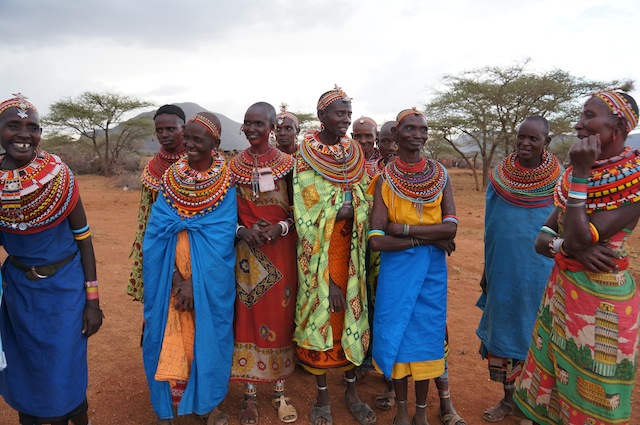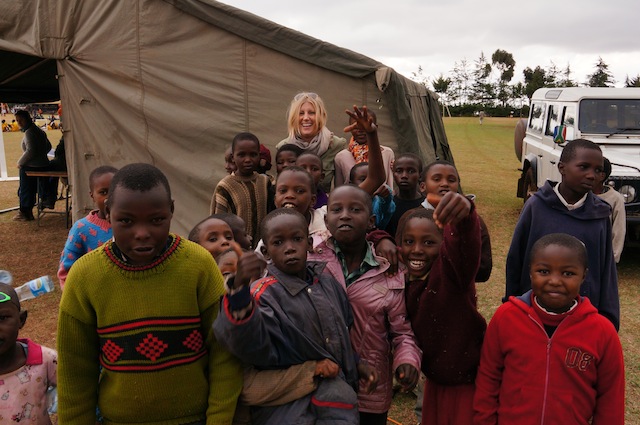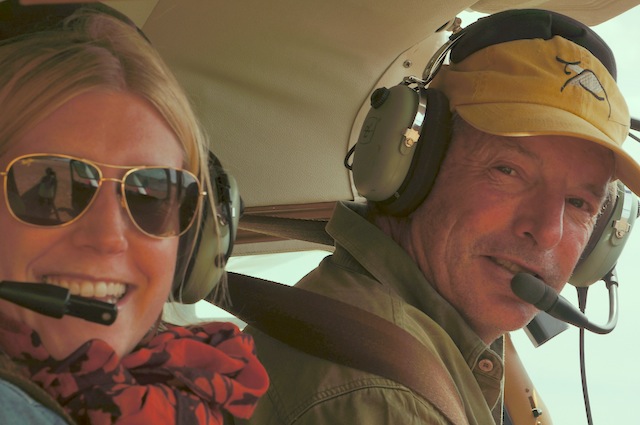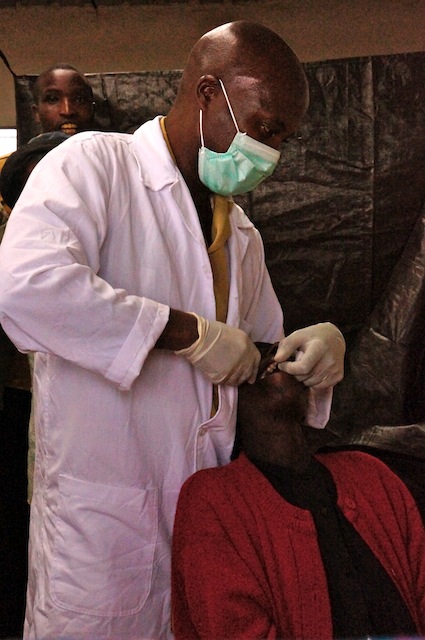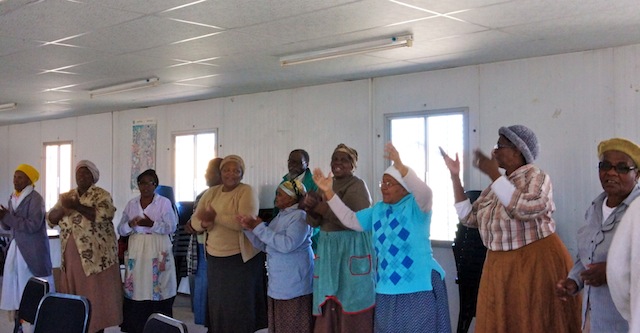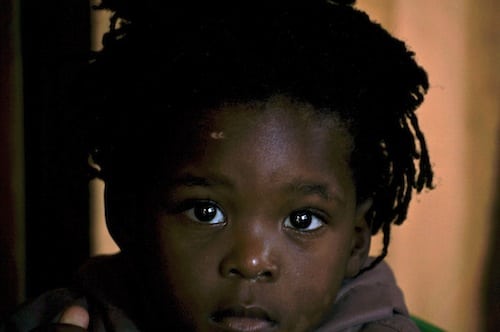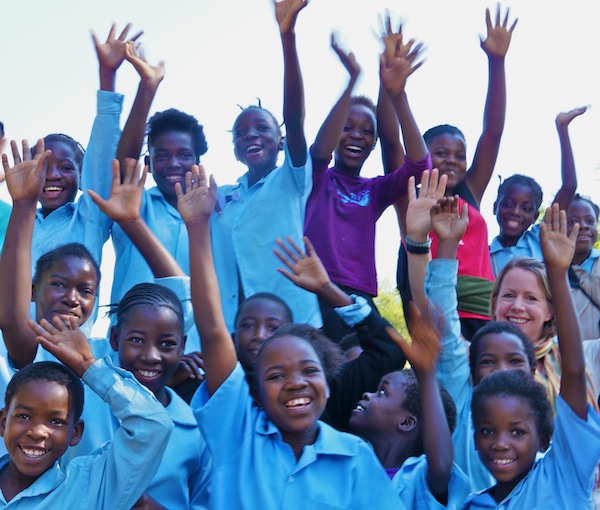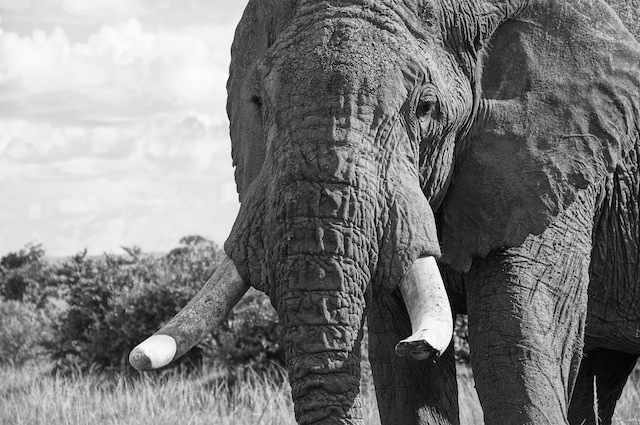Voluntourism: Six Change-Makers in Africa
Local Samburu women in Kenya.
For my list, I wanted to recognize people who realize the value of incoming tourism beyond their own personal self gain, who help channel these foreign dollars to have a positive impact on a destination and it’s local people. These advocates promote in-bound travel, employ local people, but also dedicate their limited free time to give back to their local communities. To say that I was inspired, would be an understatement– moved to help make change happen is more like it. So here it is, six change makers and how you can get involved.
1. Michael Dyer, Borana Ranch & Safari Lodge, and the Laikipia Wildlife Forum, Laikipia, Kenya.
Michael Dyer, playing pilot, flying me to Borana.
From a tourist’s perspective, the grounds of Borana are breathtakingly beautiful and animals are everywhere—precisely what you would like to see on safari. Michael and Nicky, opened Borana Ranch & Safari Lodge on the family owned land in 1990, which happened to be the first eco-lodge in the area.
For over 20 years, Michael has dedicated himself to helping teach and implement the importance of preservation, conservation, working with and supporting the community. Much to my delight, Michael and Nicky also offer guests the opportunity to visit the tannery, where they employ and then teach local, disabled or blind people the craft.
Given their dedication to the local people, I shouldn’t have been surprised to find that they also started a mobile medical clinic eight years ago. They employ two nurses and a driver to visit the local villages across the Laikipia region, Monday-Friday. These hardworking women treat over 20,000 patients per year—from vaccinations, HIV/AIDS education and notably Planned Parenthood services.
While these projects were impressive, Michael and Nicky kidnapped me for a soccer match, where I learned that Michael was one of the founders of the Laikipia Wildlife Forum which is a member driven organization that brings together land owners and resource users (from large-scale ranchers to small scale farmers) to tackle the challenges in the Laikipia ecosystem. And the LWF as it turns out, is one of the key sponsors of the “Laikipia And Beyond Unity Cup Football Tournament” (LUC). Two years ago, the LUC brought together 32 teams in remote rural locations throughout the district during five separate three day weekends, thousands of people participated in environmental education sessions and activities, ranging from tree planting, town ‘clean up’s’ to water conservation activities and over 12,000 people received free medical treatment, primarily women and children.
Post game, Michael took me back to visit the medical clinic. The lines were endless for the free aid, but it was so wonderful to see the local people taking advantage of the services provided by the volunteer doctors. I have immense respect for the brave patients who literally had their teeth pulled in front of hundreds of people without any painkillers. There was never screaming, only smiles, “asante sana” (thank you) and handshakes.
You can help: by learning more about the Laikipia Wildlife Forum and the powerful impact the “Unity Cup” has on bringing people together through sport and for such a powerful purpose. And by visiting Borana, you are helping support the work that Michael and his family do for the Laikipia Wildlife Forum, the mobile medical clinic and employing locals at the tannery.
2. James Fernie, Uthando (Love), Cape Town, South Africa.
The ladies of project NOAH singing “happy birthday” to me in English, despite our language differences. Best gift I’ve ever received.
A mutual friend put James and I in touch, and as luck would have it, I celebrated my favorite birthday yet with him. James is the founding director of Uthando, a non-profit company, which aims to create a bridge between tourism and development. James brought me to visit several of his projects, but my favorite Uthando community development was the Neighborhood Old Age Homes, or NOAH, a program providing a community center as well as medical facilities for the elderly.
There I had the opportunity to sit and have a (translated) conversation with the NOAH participants and apartheid survivors. When he mentioned it was my birthday, every one of them jumped up to perform the liveliest Happy Birthday performance I have ever witnessed. While I was already soggy eyed, what touched me most is the deep mutual respect that James and the people touched by his projects have for one another.
When I asked James about the project he was most proud of, he of course wouldn’t say. But he did mention that the elders of the NOAH program recently honored him,
“This is a huge step for a white guy to receive from folks who lived through the apartheid.”
A young pre-school student assisted by Uthando, Cape Town, South Africa.
Tourism is the biggest industry in the Western Cape and thus has a critical role community development. Growing up in South Africa during the 1980’s, James developed a deep sense of compassion for the people victimized by the cruel system of Apartheid. In the new democratic South Africa, the new form of apartheid is poverty, a system imprisoning millions of people in cycle of destitution, fear and hopelessness. James wants to do what he can to make a powerful and positive difference in building South Africa. What I loved about my visit with James, was his ability to take travelers like myself to visit areas where the majority of the population are living, to learn about the issues confronting them and discover their remarkable stories. Even more inspiring is to witness what the adversities these people face everyday and the positive energy and hard work they invest to break the cycle.
Visitors can assist: By supporting the Uthando tours when visitors come to Cape Town, by donating to one of the many projects listed on the Uthando website, or by joining one of Uthando’s prime partners in the USA, the Global Sojourns Giving Circle who invest in Uthando’s work in South Africa.
3. Maryann Fernandez, Philanthropy Indaba, New York, NY, USA
I had the pleasure of meeting Maryann last year in Chiapas, Mexico. Maryann’s connection to Africa is a powerful one. Similar to me, she left the corporate world and journeyed to Africa. From there she went on to found Philanthropy Indaba, which is a unique company that takes individuals and families, who have the ability to mobilize resources, out of the boardroom and into the field through philanthropic journeys. Maryann’s team explore critical issues, conduct site visits to effective organizations, and meet with key thought-leaders on the ground, all wrapped within an exceptional travel experience.
While Philanthropy Indaba does not run its own philanthropic programs, it does connect traveling individuals with organizations (for and non-profit) on the ground that have a positive impact on local communities. The private discussions among the participants of her programs allow for greater contextual understanding of effective investment in the region, which the organization operates. Philanthropy Indaba supports projects that are long term self sustaining solutions.
When asked if her trips might be considered depressing, Maryann answers:
“In South Africa, where we will be focusing on the HIV/AIDS pandemic, instead of being depressed, I am tremendously inspired. I can feel the effect that a concerned and dedicated group of philanthropists have made on this pandemic. They were able to move the dial on this intractable issue, and now the models developed here, can be replicated in other parts of the world. Defeating this disease has entered into the realm of possibility.”
How can travelers help? Learn before you give! Ask questions about the travel company’s connection to the project, what have people funded in the past, to what exactly your money will be applied, and who will confirm that. Also take some time to learn about why the situation exists? What other groups are working in the area and how the locals feel about that organization. From afar, do some research on the issue, read some articles, find organizations that support that issue and have clear objectives and have a feedback loop to assess their success. If you are interested in investing in reliable organizations and having an immersive travel experience, contact Maryann.
4. Lisa Gower, The Bushcamp Company, Mfuwe, Zambia, Africa
Lisa (right, middle row) and girls from the school.
I visited many schools and projects across Africa that need support. One real stand out, is the work that Andy Hogg, the owner of The Bushcamps Company is doing in Mfuwe, Zambia. He has hired Lisa Gower to run the company’s conservation and community projects through their charitable organization, ‘Charity begins at Home’. Lisa Gower is from the UK where she worked in hotel management for a number of years. An opportunity arose out of the blue to visit a friend in Mfuwe, Zambia and her life took an unexpected turn. Just two months later, Lisa swapped her high heels and corporate life and found herself living in the heart of Mfuwe.
Increasingly guests, such as myself, are becoming more interested in combining their safari activities with experiencing life in the community, visiting the schools the company supports, and meeting and interacting with the children. I was so touched by my visit to the school that, Lisa helped me select a student in need of sponsorship, Joseph Banda, who at the age of 21 wanted the chance to finally attend high school. To give you an idea of how little it takes to give someone a chance, his schooling, supplies (from toothpaste to notebooks) for term two of grade 10, full year 2013 (grade 11) and FY2014 (grade 12) is $752 USD.
Sadly, Joseph is not alone, approximately 50 percent of the pupils who attend the local schools are orphaned and live on their own or with extended family and have no means of paying for their school fees. Lisa manages a sponsorship program which now supports 280 pupils through college. This allows the children to receive an education they otherwise would not be able to receive and in turn become employable and able to support their families and the next generation.
How guests can help: From a pencil, a monetary donation or sponsoring a child– everything makes a difference! Every guest who visits A Bushcamp Company property, contributes to the Luangwa Conservation and Community Fund– 50 percent of the funds raised goes to conservation projects and 50 percent to community projects. For more information contact Lisa Gower lisa@bushcampcompany.com or visit the community page.
5. Richard Roberts, Robert’s Safaris, Richard’s Camp and The Mara Elephant Project, Masai Mara, Kenya, Africa.
On a bumpy ride, through heavy bush and past thousands of zebra, elephant and giraffes, we came to a small enclave of trees that popped out on the yellow horizon. There I met the tall, blonde and barefoot Richard Roberts, owner of Richard’s Camp and Robert’s Safaris, who came to greet our safari vehicle. Richard has lived in the Kenya’s Masai Mara from the age of three. He moved there with his parents, in 1981, where they lived in tents on the banks of the Mara River. At the age of eight Richard took his first guests on a game drive, with blocks of wood strapped to his feet in order to reach the pedals. It was a sign of things to come.
In 2011 Richard established the Mara Elephant Project (MEP) in conjunction with Escape Foundation. Human/wildlife conflict is a major issue in the Mara and MEP is dedicated to tracking elephants to better understand their behavior and to improve their security and life expectancy, particularly in relation to poaching and conflict with local farmers.
Elephant ivory still carries great value in some parts of the world. Since MEP began just over a year ago, their dedicated team of Rangers has apprehended eight ivory dealers and eighteen poachers, dramatically reducing the number of elephant deaths in the region. They have also apprehended bush meat poachers and illegal loggers.
During its lifetime, an elephant will travel across vast tracts of land. This sometimes brings them into conflict with farmers whose land they traverse, causing crop damage. MEP’s aim is to educate the farmers as to the habits of the elephants and to sensitize them as to the elephants’ plight, thus creating safe passage for the animals and reducing conflict.
Get involved: Travelers who are visiting the Mara are helping to support and sustain the National Park and its surrounding Conservancies and prevent the encroaching development with their tourism dollars alone. Donations to the Mara Elephant Project help support their on-going conservation work.
6. Andrew & Stephanie Onguka, One Life Africa, Nairobi, Kenya.
Valley View Classroom, Mathare Slum.
Did you know that 70 percent of the 2.3 million residents of Nairobi live in the slums and earn $2 per day or less? Many of the children that live in the slums receive an elementary education with the help of foreign donors. Secondary education and a possible career can most likely not be afforded. Charities like OneLife Africa are working in the some of the largest slums in the world to break the poverty cycle and give these kids a chance.
One Life Africa brought me to the Mathare Slum, the oldest slum within Nairobi to see Valley View Primary School (40 percent of their participating students currently come from this school) to meet the students and see the challenges that they are overcoming every day by working towards a career through education. One Life Africa began a couple years ago to assist “qualified” grade eight students who didn’t have the money to continue onto secondary school. The program helps give these under privileged students a chance to succeed through both scholarship and mentoring. In year two, the program supports 73 students. One studying law at the university of Nairobi law school and 72 students are attending national and provincial boarding high schools in Kenya.
Founders Andrew & Stephanie on far right, principal of valley view back mid-right, and graduates of Valley View and recipients of One LIfe Africa & their parents.
Founders Andrew (back right) and Stephanie Onguka (front right) of One Life Africa. Head Teacher and Principal of Valley View Primary School in the Mathare Slum, Moses Asumba (back, mid-right). Graduates of Valley View and current secondary students in the One Life Africa program with their parents.
Valley View currently has over 887 students and 45 teachers. Valley View’s greatest need is to help increase the monthly salary of their teachers from $100 USD to $250 USD. Other than the obvious costs of living, this increase will help Valley View (a non-formal school, in simple terms means that they do not receive government aid, but their students do qualify to test for secondary school) offer “competitive salaries” to their teachers and help break the cycle of poverty for the students.
Graduates of Valley View, secondary students and participants in the One Life Africa program. Rosemary ((left) graduated first in her class from Valley View last year, Hillary (center) was one of the first students accepted into One Life Africa two years ago and Lillian (right) one of the top graduates from Valley View last year. While undecided, each wants to explore a career in the medical field to return and help their communities.
Visit or donate: OneLife Africa.
For more volunteer resources, check out:
